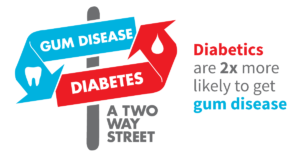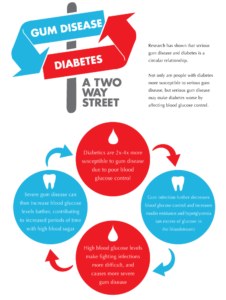You’re probably already aware that diabetes can have a negative impact on the heart, blood vessels, eyes, kidneys, nerves and other important systems in the body. But were you aware that it can also cause problems with your dental health?
Research has shown a circular relationship between serious gum disease and diabetes. Not only are people with diabetes more susceptible to gum disease, but serious gum disease may make diabetes worse by affecting blood glucose control and contribute to the progression of diabetes.
How does diabetes affect the mouth?
Glucose, the sugar linked to diabetes, is present in your saliva. When diabetes is not controlled, harmful bacteria grow due to high glucose levels in your saliva. These bacteria combine with food to form a soft, sticky film called plaque. High glucose levels = increase in plaque
What happens if I have plaque?
- Gingivitis: A less severe form of gum disease, gingivitis is an inflammation of the gums caused by plaque buildup. If not brushed away, plaque hardens into a barnacle-like material to form calculus, commonly known as tartar. Just like lime deposits on a shower drain, the hardened calculus is difficult to remove. The biofilm, a sticky combination of germs and bacteria, will continue to grow and infect your gums, sometimes causing redness and bleeding you may or may not see.
- Periodontitis: Gingivitis, if left untreated, will progress to periodontitis. With periodontitis, calculus deposits expand on the surface of your teeth, edging down below your gum line. This condition causes your gums to separate slightly from the teeth and supporting bone, forming periodontal pockets. It creates swelling, bleeding, pain while chewing, teeth misalignment and looseness. Some patients also have sores inside the mouth, chronic bad breath, and sensitive teeth. A discharge of puss from the gums, called pyorrhea, is another symptom of periodontitis.
Gum disease and diabetes: A two way street
Research has shown that people with diabetes are more likely to develop severe gum disease and lose more teeth than people who don’t have diabetes.
⇒ Diabetics are 2x-4x more susceptible to gum disease due to poor blood glucose control
⇐ Gum infection further decreases blood glucose control and increases insulin resistance and hyperglycemia (an increase of glucose in the bloodstream)
⇒ High blood glucose levels make fighting infections more difficult and cause more severe gum disease
⇐ Severe gum disease can then increase blood glucose levels, contributing to increased periods of time with high blood sugar
What is the link between gum disease & diabetes?
- Diabetic Control: Research has shown people with poor blood glucose control get gum disease more often, more severely, and they lose more teeth.
- Blood Vessel Changes: Diabetes causes blood vessels to thicken, which slows the flow of nutrients and the removal of harmful wastes, increasing the risk of gum infection.
- Bacteria: Many kinds of bacteria thrive on sugars, including glucose. When diabetes is poorly controlled, high glucose levels in saliva enable germs to grow and set the stage for gum disease.
- Smoking: A smoker with diabetes, age 45 or older, is 20x more likely to get severe gum disease.
How can I prevent gum disease and other oral complications?
Proper blood glucose control and oral health maintenance is key to controlling and preventing mouth problems.
- Keep your blood glucose numbers as close to your target as possible.
- Eat healthy and follow the meal plan that you have worked out with your doctor or dietitian.
- Brush your teeth at least twice a day.
- Floss at least once a day to prevent plaque from building up on your teeth.
- See your dentist twice a year for a cleaning and checkup.
Controlling your blood glucose, brushing and flossing every day, and visiting a dentist regularly is the best defense against the oral complications of diabetes.
Resources
“Diabetes and Oral Health.” www.nidcr.nih.gov. Web. 3 November 2016. <http://www.nidcr.nih.gov/oralhealth/Topics/Diabetes>
“Diabetes and Oral Health Problems.” www.diabetes.org. Web. 3 November 2016. <http://www.diabetes.org/living-with-diabetes/treatment-and-care/oral-health-and-hygiene/diabetes-and-oral-health.html>
“Diabetes and Periodontal Disease.” www.perio.org. Web. 3 November 2016. <https://www.perio.org/consumer/diabetes.htm>
“Diabetes and Periodontal Disease.” www.webmd.com. Web. 3 November 2016. <http://www.webmd.com/diabetes/periodontal-disease#1>
“Diabetes, Gum Disease, and Other Dental Problems.” www.niddk.nih.gov. Web. 3 November 2016. <https://www.niddk.nih.gov/health-information/diabetes/preventing-diabetes-problems/keep-mouth-healthy>




Leave a Reply